Money spinning 'plastic surgeon' in the net
By Manjula Fernando
In the aftermath of the shocking death of a lady doctor specialised
in plastic surgery in the hands of an alleged medical quack, the Sunday
Observer interviewed Dr.Sathis Wijemanne, a consultant plastic surgeon
and an office bearer of the Association of Plastic Surgeons of Sri Lanka
on the lesson learnt with Dr.Priyani's untimely and tragic death.
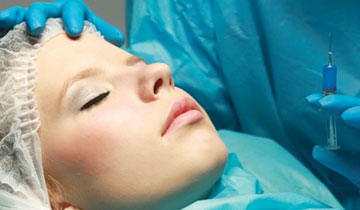 Dr.P.A.Priyangani, 47, a specialist doctor at the Plastic Surgical
Unit of the Lady Ridgeway Hospital and a mother of two children died
last Tuesday at an ill-equipped private clinic in Visakha Road, Colombo
4, when an antibiotic administered on her, prior to a cosmetic surgery
caused an adverse reaction. The Doctor who performed the surgery
Dr.Nimal Gamage has been remanded till August 18. Dr.P.A.Priyangani, 47, a specialist doctor at the Plastic Surgical
Unit of the Lady Ridgeway Hospital and a mother of two children died
last Tuesday at an ill-equipped private clinic in Visakha Road, Colombo
4, when an antibiotic administered on her, prior to a cosmetic surgery
caused an adverse reaction. The Doctor who performed the surgery
Dr.Nimal Gamage has been remanded till August 18.
Q: Do you think the death of Dr. P.A. Priyangani could have
been averted ?
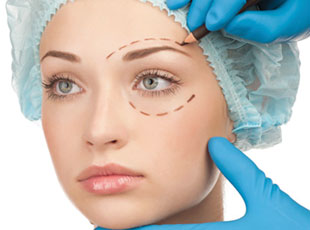 As plastic surgeons, this is our concern. According to the
information that we have gathered, the doctor who performed the
procedure had said her death was due to an adverse reaction to a drug he
had administered to the client. Adverse reactions are not uncommon. It
can even happen at home. For instance someone may develop an adverse
reaction to certain fruits or to a particular hair dye. As plastic surgeons, this is our concern. According to the
information that we have gathered, the doctor who performed the
procedure had said her death was due to an adverse reaction to a drug he
had administered to the client. Adverse reactions are not uncommon. It
can even happen at home. For instance someone may develop an adverse
reaction to certain fruits or to a particular hair dye.
In a surgical practise we use certain drugs, antibiotics, painkillers
or drugs to minimise bleeding, or for anaesthesia, it is not uncommon to
see a mild adverse reaction. The doctor has to be prepared for such a
situation. The question is was he ready to treat such a condition. If
you are doing a surgical procedure, even if it is a minor procedure or
an extensive surgical procedure, the physician should be ready with the
relevant antidote or the instruments in case the client develops an
adverse reaction.
These medical procedures should be performed in well -equipped
surgical theatres. An anaesthetist should be close at hand. In this case
the procedure was done in a makeshift clinic and not in a hospital.
Q: She was a doctor specialising in the same medical
discipline - plastic surgery- she could not have been unaware of this
particular doctor's history if he had a tainted past and also the
potential risks. Can you comment on this?
She must have been aware of this person and the risks involved. The
Association had been discussing his unethical practice since 2011. Why
she did not come to one of the 12 registered plastic surgeons in the
country to do her procedure is a difficult question to answer.
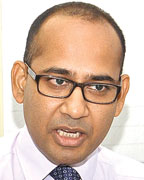 |
| Dr. Sathis
Wijemanne |
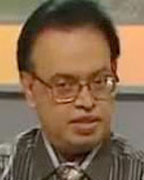 |
| Dr. Nimal
Gamage - the alleged culprit |
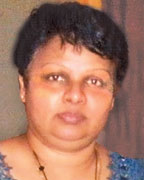 |
Dr. P.A.
Priyangani -
the unfortunate victim |
She had worked for a plastic surgical unit for a long time. Then she
moved into the current Plastic Surgical Unit (at the Lady Ridgeway
Hospital). The same question was asked from the consultant under whom
she was working at the LRH (Dr.Romesh Gunasekera). She could have gone
to a another country and got it done in a reputed, specialised place.
But she went to this particular clinic with some of her close friends
who had patronized this place before. The reasons could vary from
'privacy' to the effective marketing techniques used by this doctor. She
was aware of the techniques but someone she had a lot of faith in it and
could have promoted this place. People get a false feeling of confidence
by the fact that the procedure is done under local anaesthesia.
Q: The Sri Lanka Plastic Surgeons Association said the
particular Doctor is not licensed to perform the procedures such as what
he did on the late Dr. Priyangani?
The unfortunate thing in Sri Lanka is that if he is a qualified
doctor, under the Medical Council regulations, that person is allowed to
perform surgeries and certain procedure. There is no way for people to
know if that person is specialised in that particular area.
It is not a question of only plastic surgery, even orthopaedic
surgery, general surgery and other forms of surgery there is no register
for the public to refer to. Therefore, there is no way of regularising
their license.
But in the state sector this is not so, to work in the capacity of a
Consultant or a Specialist in the state sector, we must have a
postgraduate diploma from the Post Graduate Institute of Medicine in
Colombo and have overseas training at a reputed centre at least for a
year or two. Then once we come back we face Board Certification at the
Post Graduate Institute of Colombo.
When it comes to reputed private hospitals, they look for the
credentials of the doctor. They follow what the Government follows.
There is no particular set of rules that govern them. But they get the
services of Board Certified specialists and surgeries or even a simple
procedure like this would be done in a surgical theatre, in a safe
environment.
Q: Those reputed hospitals are too costly for most of the
people?
But would you like to take that risk. You cannot perform a cosmetic
procedure that involves medical complications, in an ordinary beauty
parlour. Those coming for cosmetic procedures are healthy individuals.
Hence we must go beyond our limits to ensure patient safety.
If you visit the particular clinic where this lady doctor died you
will see, the size of the lift is not adequate enough to bring even a
stretcher down.
Q: Do you think the Private Health Services Regulatory Council
has failed in their duty by allowing this doctor to operate freely?
The public should point accusing fingers at these officials who
authorised this person to practise. I suspect there has been a breach in
the system. He had got a license to operate this place as a cosmetic
clinic without the required facilities. It was not a hospital, the place
where he performed the procedure was not a proper surgical theatre.
If you go through the normal process, that place will never be given
a license to what he did there. We need to find out who promoted this
place? He was given unnecessary publicity in the media too.
Doctors are bound by ethics, the Hippocratic Oath. We have guidelines
at the Sri Lanka Medical Council. We are prohibited from advertising
ourselves, it is unethical.
Q: Has the Association raised the issue of his ad campaign and
unethical practice with the relevant authorities?
I am not sure if we raised the issue of his ad campaign. But we have
complained in writing about his practice and his background, to the
health authorities since 2011.
The system is such in Sri Lanka that our Association, a doctor or an
individual cannot make a complaint against a doctor. The complaint must
come from a patient to the Medical Council of Sri Lanka. Unfortunately
in this instance the patient is no more - she is dead and gone. We have
raised the issue of this doctor who is running the cosmetic clinic, but
according to the present system, no action can be initiated.
Q: Can it be an incident of a one in a million, a rare
occurrence that could have happened even in a hospital theatre?
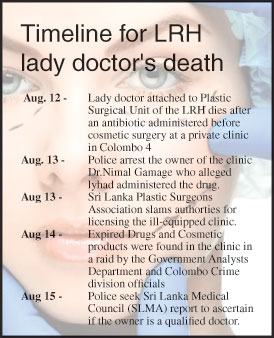 Doctors who perform such surgeries in hospitals give antibiotics
intravenously, just before surgery, that is the standard protocol to
prevent infection. But when it comes to cosmetic surgeries, not even a
slightest chance should be taken. Here you are not dealing with an
ailing person. In the private sector only branded drugs are used. Such
drugs rarely cause an adverse reaction. Doctors who perform such surgeries in hospitals give antibiotics
intravenously, just before surgery, that is the standard protocol to
prevent infection. But when it comes to cosmetic surgeries, not even a
slightest chance should be taken. Here you are not dealing with an
ailing person. In the private sector only branded drugs are used. Such
drugs rarely cause an adverse reaction.
In the state sector, the generic drugs are used but surgical theatres
are geared to face any situation, most of the time these cases are
easily handled and they don't develop complications.
Q: The procedure available in this particular clinic are
freely available in Sri Lanka?
One would have wondered why this procedure was not performed in one
of the leading hospitals in the country. It is available in private
hospitals.
In that instance the lady doctor was subject to volume correction on
her face. This is a common procedure in Sri Lanka. There are so many
ways, even less cumbersome ways than what she was offered by this
doctor, to do it.
He had offered this particular lady doctor a special procedure where
we mark the areas that need to be corrected on the face, and inject fat
extracted from her own body under local anaesthesia. Some doctors prefer
to do this procedure under general anaesthesia. The advantage is the
consultant anaesthetist is around if it's done under general anaesthesia.
We harvest fat from a suitable area in the body, it could be the
upper thigh or from the abdomen, depending on what type of correction we
are trying to do. After harvesting the fat, we process it within a short
time and transfer it to a suitable syringe, then we infiltrate it to the
area that is marked, in this instance it was around her eye. This is
what is called fat grafting.
That is only one way of doing it, there are so many other ways.
Q: What are the risks involved in such a surgery ?
The risks can be divided into two groups, procedure per se and
complications due to any surgery. The common complications resulting in
any surgery includes the client developing a reaction to the antibiotic,
to the local anaesthesia, a draft allergy or if it is done under general
anaesthesia. Rarely are there complications that are not fatal.
If it is procedure-wise, again it can be divided in two - the donor
site complications, and complications related to the procedure. The
donor site complications can include an infection in the site or the
punctures can leave scars.
The facial complications could include, even after the procedure the
face could be asymmetrical. We may have to recorrect it. Then there can
be bruising on the face. But usually it settles with time. Then there
may be scars or infections and other temporary effects. If the clinician
is going beyond his safe limits, the client will have unnecessary
complications.
These procedures are common all over the world. But the client has to
be told of the procedure and should be given ample time to rethink in
between consultations. She should not be rushed or misled into taking
risks.
Q: Can you reverse a procedure like this if the client is not
happy with the result or she has second thoughts on what she did?
That is why some of us don't practise this in the aesthetic set up.
If the volume is large, for instance if it is more than 5 cc, then I
will be considering the fat to be injected. If you inject fat to the
face it is quite difficult to reverse the result. But if you give dermal
fillers, the results can be reversed, immediately or whenever the
patient wants it. Drugs that can be injected to dissolve it, these are
all natural substances.
But with fat the client will have to undergo mini liposuction to
remove the fat. Similarly if the client gains weight, there is a risk of
them gaining weight in the face as well, if the abdominal fat is used
for drafting.
Q: Do you think the law needs to be amended to address such
issues?
We have already given recommendations for amendments. We had meeting
after meeting at the Medical Council to discuss the issue of a
specialist register and to regulate the health sector. The last meeting
in this respect was held about a year ago. Our laws are outdated and
this has been repeatedly pointed out to the authorities.
Q: In the present set up how can an individual look for a
proper place or a doctor to undergo a similar procedure?
If you want to get a cosmetic procedure, find a reputed consultant,
then check for his credentials and his experience. Inquire about the
results to get an idea of your post surgical image. Make sure you
procedure is done in one of the reputed places where resuscitative
facilities are available.
At the moment, anyone can check if the doctor in question is a Board
Certified person by logging into the Post Graduate Institute of Medicine
at the University of Colombo.
Another issue is, when qualified clinicians who have practised in
other countries as consultants come to Sri Lanka, there is no way for
the Medical Council to register them. They have graduated from reputed
Medical Colleges and completed their post graduate studies. There needs
to be a system to obtain the services of such qualified medical
personnel.
Our recommendations propose amendments to facilitate their absorption
into the system.
|

